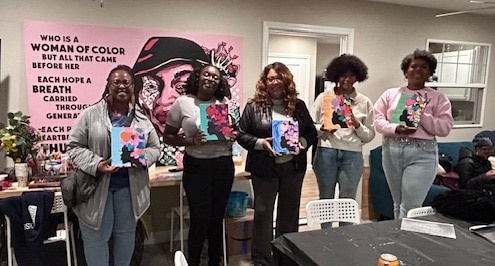Content warning: this article talks about suicide.
Ohio State Representative Erica Crawley has been leading the 26th District in Central Ohio since 2019. Before becoming an elected official, she was a prominent attorney and worked for many social service and advocacy organizations such as Cuyahoga County Job & Family Services, YMCA Head Start/Early Head Start Program, Court Appointed Special Advocates for Children (CASA), and the Black Child Development Institute (Atlanta Affiliate). Her road to success and leadership has been met with many challenges, and she shares her story with Mental Health America of Ohio today as a way to connect with and inspire others who may be experiencing similar challenges.
Rep. Crawley was raised in Youngstown, Ohio by a single mother. At the age of 16, Rep. Crawley started experiencing symptoms of major depression and began going to therapy. She explains that she was raised not to talk about family issues, which made it challenging for her to process her own mental illness and trauma.
“Getting help was not something we would do,” she says. “You don’t tell other folks your business. So, I was dealing with it in silence for a long time.”
She then entered college at Cleveland State University, and her life became increasingly difficult. Balancing friendships, classes, work, and her relationship with her mother, who was experiencing a substance use disorder at the time, all created a lot of stress, and she began to have suicidal thoughts.
“I couldn’t figure a way out,” she says. “Life was overwhelming. I thought if I could just end it all, I wouldn’t be a burden on my friends and family. So, I thought maybe it would just be best for everyone if I was no longer here.”
Then she attempted suicide. The event gave her resolve, and she decided to leave school and join the United States Navy. She explains that her time in active duty provided her with discipline and structure. It also was an opportunity to form new friendships, and the comradery helped her determine what she wanted to do with her future.
When her service was complete, she moved to Atlanta and very shortly after found out she was pregnant with twin girls. At 18 weeks she went into pre-term labor and was put on bedrest for the remainder of her pregnancy. This was an extremely challenging time because she had just moved and started a new job in a new city with no friends or family living close to her.
“I went from no kids to two kids at the age of 23,” she explains. “It felt like my world was upside down again. I felt like life wasn’t fair. I was always taking care of somebody – my mom and now my kids – and I felt like I was being punished.”
Rep. Crawley moved back to Ohio to be close to family and started going back to therapy. She was managing as best as she could with two young children on her own, once again balancing work, the relationship with her mom, and the breakup with her children’s father.
“It was at this point that I had my second suicide attempt,” she says. “I remember looking at my children and thinking they deserved better. They have a great godmother and family, and life would be better for them if they could grow up in a place without my struggles. So once again I threw in the towel, and God threw it right back at me.”
Looking back, she says, the adversities that she experienced paved the way for her to get to where she is today. With the help of medication and therapy, she was able to manage her depression. Then one day in 2011, her prescription ran out, and she didn’t have any refills. Her pharmacy turned her away, and she felt abandoned by the health care system. The emotions she felt were very extreme, she explains, and it was at this time that her therapist determined that she wasn’t just living with major depression, but also with bipolar disorder.
“An accurate diagnosis helped me create a lifestyle that allows me to be productive and still take care of myself.”
Since getting her diagnosis, she has reached a point of healing and recovery. But, she explains, it ebbs and flows. She maintains a treatment regimen that works for her, and she has a wonderful support system – including her mother who has been sober for 18 years. Rep. Crawley explains that she feels she is living her purpose now as an elected official, but it hasn’t been easy.
“People assume because you are a State Representative that you have your life together, but the things people see externally take so much effort, time, and sacrifice,” she says. “So, even though I schedule time for myself, there are things I sacrifice to be able to do this work.”
Creating a lifestyle that works for her has been critical to her mental health, and she’s proud to be able to impart the things she’s learned.
“They know the difference between my upbringing and theirs,” she says. “They’re aware that Mom has a mental illness. We’ve talked about my struggles with suicide, and we have a very open dialogue. So I’m able to help them through conflict resolution with what I’ve learned.”
Now, Rep. Crawley is focused on improving access to mental health resources and education for those in her community – including working on policy changes that will help improve the Black infant mortality rate and the factors that contribute to it such as toxic stress, financial strain, and lack of insurance coverage. She also serves on the Steering Committee of the Franklin County Suicide Prevention, a program hosted by MHAOhio, to inform local suicide prevention efforts.
“In addition to legislation, I’m focused on funding to make sure we have a real investment in Black and Brown communities,” she says. “If we can alleviate some of the issues that impact mental wellbeing, then we can solve a lot of other issues as well.”
MHAOhio thanks Rep. Crawley for sharing her story so openly and advocating for mental health in her personal and professional life.
“Prior to my time in the legislature, I never spoke about my traumatic pregnancy or living with my mental illness, but it’s all in the spirit of making sure I can help at least one person,” she says. “You don’t have to fall victim to your illness. You can be powerful and be in control of your life.”












